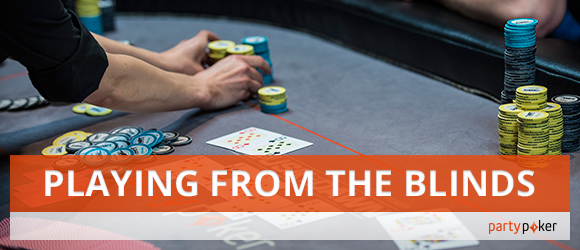It is often said in poker that the worst two positions you can play from are the small blind and big blind. You already have chips committed pre-flop and there are a number of reasons why these two positions cost the poker player more chips than anywhere else at the table. We take a look at seven ways you can prevent it happening to you.
Prepare to Succeed
A common phrase in life as well as poker is that if you fail to prepare, then you should prepare to fail. This is possibly never truer than in poker positions you feel uncomfortable in. The very nature of the blinds is that some of your chips are at risk whether you like it or not. But while the mandatory bets get the action going, they can put paid to your stack if you’re not very careful. You must retain a positive mindset about playing from these positions. You do not need to play a high percentage of pots from the blinds. The amount you’ll be losing if you fold most of the time will be a fraction of your stack, so stay positive.
Tighten your Range
One way not to lose a lot of chips from the blinds is, of course, not to play so many hands. You don’t want to fold every time as players will get used to you doing so and start taking liberties every time. But you can be careful about what you play. You are going to be first to act a huge proportion of the time you make a call or have a raise called from the blinds, so be prepared to open the action post-flop. Try to play the following sort of hands from these two seats: Pairs you are confident with and that play well against a range of your opponents, AKs down to ATo, KQs to KJo and some suited connectors. While QJs is better than 78s for instance, these lower suited connectors can often have success from blind positions. You may have to be prepared to float like a butterfly to sting like a bee!
Don’t Defend Too Lightly
One key weakness players display when playing too often from the blinds is defending the indefensible! While your K8s looks pretty, if you face a min-raise from one player and two other have already called, are you really in great shape to make it up from the small blind, knowing that you may be out-kicked if you hit and making the first move without any information if you’re not? That is a recipe for losing chips quickly and regularly. Think about what you would do if a player in the small blind made a call that looked like they were defending, then a very action-inducing flop like Q-J-9 came. You would be all over them like Iceland at a long throw. Rubbish cards go ‘into the muck’ for a reason.
Identify Player Types
While you’re not playing every hand from the blind, they provide a really great chance for you to observe how people play poker in later positions. This is key information and you should monitor it. After all, it may well be crucial when you’re in the button one or two hands later and you want to know what the player in the cut-off while you fold in the blind might be thinking in mid-late position when you have positional supremacy. Whether players are loose, passive, aggressive or tight is a much harder trait to figure out if you only ever observe them from hands you participate in. Being able to identify player types without being in the hand is important. Gathering information always pays off.
Play Back at Bullies
Bullies in poker will often target the blinds as an easy way to make regular money. Watch your opponents carefully and look for the types who do this. When they try to do it on your big blind, punish them by re-raising and taking back the power they are trying to demonstrate. Fight back against a bully and they often shrink. At a poker table, that can mean the difference between you playing a passive, ‘catch-up’ game to becoming table captain. Lay down the law to anyone who goes after your blinds without good reason.
Induce Poor Actions
Poker is a game of very small margins, and one edge you definitely want to try to perfect is in inducing bad players to make poor decisions. Whether it’s a bad call, loose raise or ill-timed all-in move, players who fail to process hands are giving their money away, and the blind positions are often going to get to see them do so more regularly just because they have a vested interest in the hand! Watch for mistakes keenly and if you see an opportunity take advantage. The player who is sat in middle position often misses out on the chance to take an overly-loose player out of a tournament or reduce a cash game stack to fresh air. The blinds are an ideal position for being Sheriff to any rustlers who have taken their eye off the rope!
Practice Pot Control
Have you ever played a pot against a player who made a mockery of the way you had position on them at the start of the hand? You have the opportunity to do the same, and playing from the blinds is often the position from which this skill is developed. There is a twisted logic that if you tell a child to do something, they will resist, but if you tell them to do the opposite, they’ll comply with your original wish. Poker players are often like children with their backpacks, bottle of drink and note from their mother, so make sure that you manipulate them by pressurizing them to decisions by acting first or potentially re-raising with good showdown hands you think you can get value on during the streets before the river. By stepping out of line, you can often get a fold, as the assumption would be that to check-raise from the small blind for instance would only be done with a very good hand because you are at such a disadvantage, position-wise. Take control by forcing your opponent to second-guess your lines of action more than you have to with theirs.
Good luck from both blind positions and may every monster hand you are dealt come in late position as a reward!
Tagged with: beginner strategy • Cash Games • poker strategy


